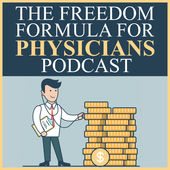Because tax time only comes once a year, most physicians prefer a low-maintenance approach when it comes time to file. When tax time approaches, all a busy physician has to do is drop off their documents to their nearest tax preparer and let someone else handle it. While there is nothing wrong with this “file and forget it” method, physicians could be missing out on money that is legally theirs to claim.
This is where Craig Cody comes in.
Craig Cody, a former law officer turned CPA and Certified Tax Coach, has been on a mission to help others cut their taxes and keep more of their hard-earned money. As a Tax Coach, he works with them so they do not miss out on tax savings and deductions that they could easily qualify for. He decided to do something about it, co-authoring a book “Secrets of a Tax-Free Life” and a business dedicated to helping tax preparers better.

In his conversation with Freedom Formula for Physicians, Craig Cody shared how physicians can avoid that same fate as some of his clients who missed out.
Breaking Free of Tax Procrastination: Why Physicians Should Talk Taxes More Often
The key to Craig Cody’s tips is learning to leverage taxes. Like most people, physicians only focus on the consequences of taxes. They focus on what they have to pay. Instead, Craig Cody urges physicians to focus on the opportunities in taxes. The tax code is incredibly complex, but that complexity can be used to your advantage.
Need some examples? Here are Craig Cody’s top tips for reducing your tax bill:
- Work with your CPA throughout the year
Tax planning is a year-round activity, not a one-time event. Things change during the year that could impact your taxes. Waiting until the end of the tax season to report these changes might be too late. The ideal time to meet with a tax professional (like a CPA or accountant) is when these changes happen. That way, you can address the potential tax implications early.
- Look into medical expense reimbursement plans
Medical expense reimbursement plans, or MERP, are tax programs created by the IRS to cover some of the costs associated with health care costs (insurance copayments, deductibles, and expenses). As Craig Cody pointed out in our conversation, a MERP isn’t limited to your employees. A MERP can be used to cover some of your own health expenses.
- Know when (and when not) to write off business losses
It’s common knowledge that businesses can write off their business losses, but it’s important not to misuse this principle. Governments expect businesses to make a profit and may question your intentions if your business remains unprofitable for a long period.
- Take advantage of a “late election”
For some tax situations, it might be helpful for an LLC to be taxed as a corporation or S corporation. In those situations, you can turn back the clock, so to speak. If you haven’t filed your returns under the “LLC” designation, you can use another designation. (In tax terms, “you can choose a different election”).
- Build a team of advisors
As mentioned above, taxes are not a solitary activity. Taxes involve interactions with plenty of people, including employees, contractors, vendors, or more. Understanding these interactions and how they can affect your taxes can be tricky. Take the time to talk other financial professionals (not just your tax preparer), who can help you understand how things fit into your tax plans.
Flexibility & Preparation: The Ultimate Keys to Paying Less Taxes
Reducing your taxes (the legal way) isn’t about manipulating loopholes. It’s about leverage. Use the tax tools available to you to put yourself in a better tax situation. By taking a little time to understand these tools and access the resources around you, your medical practice could find itself with a little (or a lot) more extra money in the bank from Uncle Sam next year.
Get your free copy of my book here.
Newsletter
Subscribe to our Newsletter! Join our mailing list to receive the latest news and updates from our team.

